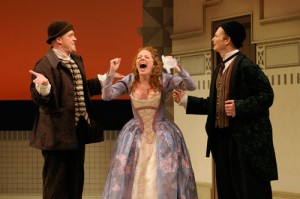So, you want to go to drama school. How do you find the school, or schools, that are right for you? The school that will help you transform yourself and your acting? The one that will be worth taking several years out of being in the marketplace and pursuing work? There are many, many actor training programs to choose from in the United States, alone — not to mention the United Kingdom. One can easily become overwhelmed surfing the websites of the top 10 schools, not to mention the top 25.
But websites are a great place to start. You can do worse than begin with a listing of the top 25 schools — there are various lists, just Google or explore the StageAgent college database. Then, as you click from website to website, and later as you connect with current students, faculty or alumni, in person or by phone, keep the following criteria in mind. In fact, keep a journal. The search for a school that fits you is a journey and a process, and you may be surprised at how your thinking evolves.

Vision, Mission and Aesthetic
Sometimes schools have a formal mission statement. In other instances, you can divine the aesthetic through photos, curriculum, and school productions. What do these elements tell you the school values? What kinds of plays are being done there – primarily classical works like Moliere and Shakespeare or contemporary plays by well-known or emerging writers?Are there camera classes? Are there other disciplines in the school besides acting – e.g. playwriting, design, directing?
There are advantages and disadvantages to inclusive and exclusive (actors only) models. Shakespeare is the passion of some young actors, and the bane of others. What’s important is to read up on a range of schools, make notes on what excites you… and what doesn’t. School websites can reflect the vibe, or life, of the school itself. But a website is a threshold; there’s more beyond that door.
Reputation and Alumni
A school’s reputation rests with its alumni. All schools tout their famous alums, and they are worth noting, but perhaps more important, are the number of “working professionals” a school produces over time, the work they produce and where they produce it. Broadway and Off- Broadway?Regional Theaters? Film? TV?

Are alumni in ancillary careers such as academia, or have they evolved into another branch of the business – becoming directors, playwrights, producers? A good drama school will provide you with a solid and supple foundation upon which you can build the unique house of your own career, adding wings to that house as the years go by. If you choose School A, you will eventually join the ranks of their alumni. What are those folks doing today? Do their career paths appeal to you?
TIP: Search for alumni activity on the website or ask teachers and friends. Pay attention to actor bios in play programs. Make a note of where actors you work with (or actors whose work you you’ve seen and especially liked) trained. Odds are that training has played a big role in bringing about the work you admire.
The Audition Process
Auditions are nerve wracking. The audition you do for a school counts for 80-90% of your application and hugely impacts the decision to accept or reject your candidacy. It can be difficult for applicants to do their best work when the stakes are so high. Remember: the audition is a two-way street. It’s important to realize that you are auditioning the school as much as the school is auditioning you.
Note how the auditors conduct the process, how they work with you, how they treat you, what they are focused on seeing from you. The auditors are gatekeepers and the school’s ambassadors, and the tone they set likely reflects the tone of the school. Be honest with yourself: do the people who audition you terrify or inspire you?
TIP: A visit to a school, either before applying or during a callback process, is worth its weight in gold. There is no substitute for experiencing the halls and seeing the facilities. Perhaps, catch a performance, sit in on a class, or take one. A virtual vibe is no substitute for the real thing.

Faculty and Students
Facilities and location (New York, Seattle, San Francisco, New Haven) certainly contribute to the experience of actor training, but an acting school is fundamentally not about the space or the city in which one lives but about the teachers and students who make up the school community at any given time.
Ask to talk to current students – either during a visit or by phone. What kind of people are they? What kind of energy do they give off? Do they love or hate their training experience? Talk with faculty, too. Are they curious? Are they still evolving as artists? Actor training is a highly individual, intimate and personal experience, undertaken in the context of a small ensemble of 8 or 12 or at most 20 other people.

The faculty and students you talk to should make you want to jump and shout and move right in! If they don’t, you are probably in the wrong place for you, even if you are offered the Holy Grail there – i.e. the much sought after “full ride” where all expenses are paid.
The Cost of Attending
Drama schools can be expensive, and certainly many of the top-ranked schools are. Scholarships and stipends vary widely and you are wise to research the cost of an entire program (all two, three or four years) early in the audition process.
That said it can be a mistake for cost to be the defining factor in your decision. Look for a school with a good financial aid manager who can help you find scholarships beyond what a school offers, create a budget where the amount you are borrowing will be as low as possible and make a plan for how to pay back necessary loans.
Realize that you are investing in your artistic future. Take the time to assess all the long term implications – financial and artistic—of that investment.

TIP: If cost is a factor for you, get your financial aid forms in early. Begin a conversation with the Financial Aid Office as soon as you receive your audition date and time, and renew that conversation when you get a callback. Drama School – actor training – is a multi-year undertaking and should be a transformational process that generates personal growth as it facilitates the mastering of craft. It’s a deeply personal, frequently intense journey — at once harrowing and exhilarating.
There are marriages that don’t last as long as drama school and the friends you make there are friends for life, because you spend so much time together, revealing your best and worst sides to one another. Much of actor training is learning to be present, to trust and follow your instincts, to come fully from your heart and your gut and to love exploring the unknown. Let your choice of a place to train be an intuitive leap into the unknown, supported by research and reputation and offers of aid, but fundamentally an expression of who you are, and you will be on your way to making the most of what drama school has to offer.















8 comments
You touch upon it a little under “Faculty and Students”, but in my experience as an untrained actor, I find amazing variations in–
ATTITUDE
Do the top people and their subordinates give off a positive attitude, or are they a bunch of “condescending d—–s who take out their failure to succeed in the non-academic world on their helpless students”, as one of my university-trained friends once put it? Do they talk about theater, or themselves? Do they mingle with the mortals, or stay on Mt. Olympus? Do they encourage the students to gain experience where they can get it, or are they prohibited from working anywhere not approved by the high and mighty? Do they support finding one’s own way, or is there only The Program? Do they encourage actors to learn the technical fields and vice versa, or is it that toxic battle of Actors vs. Technicians?
Re-reading this article over a year and a half later, and it’s still excellent.
Thanks, Dude! -Laura, Editor
Oops, I forgot to mention one more thing–Excellent article. It covers almost all of the bases.
I would add one more thing–Remember, it’s YOUR life and career at stake, and likely your parents’ and/or grandparents’ money. Consider their opinions, but keep in mind that in the end, it’s YOUR life and career. What you want may not be practical; what they want may not be desirable. Look for balance.
Amazing post! Thank you very much!
I agree that you should look at a school’s values to determine if they are a good fit for you. You also mention finding out what excites you and then find your musical training school that matches that. I think it’s important to choose a school of performing arts that has smaller class sizes and teachers that are able to spend a lot of one on one time with their students.
Thank you for sharing such an informative blog. This will definitely help beginner in starting their career.
Thanks, Shashi, for your kind words. –Laura, Editor